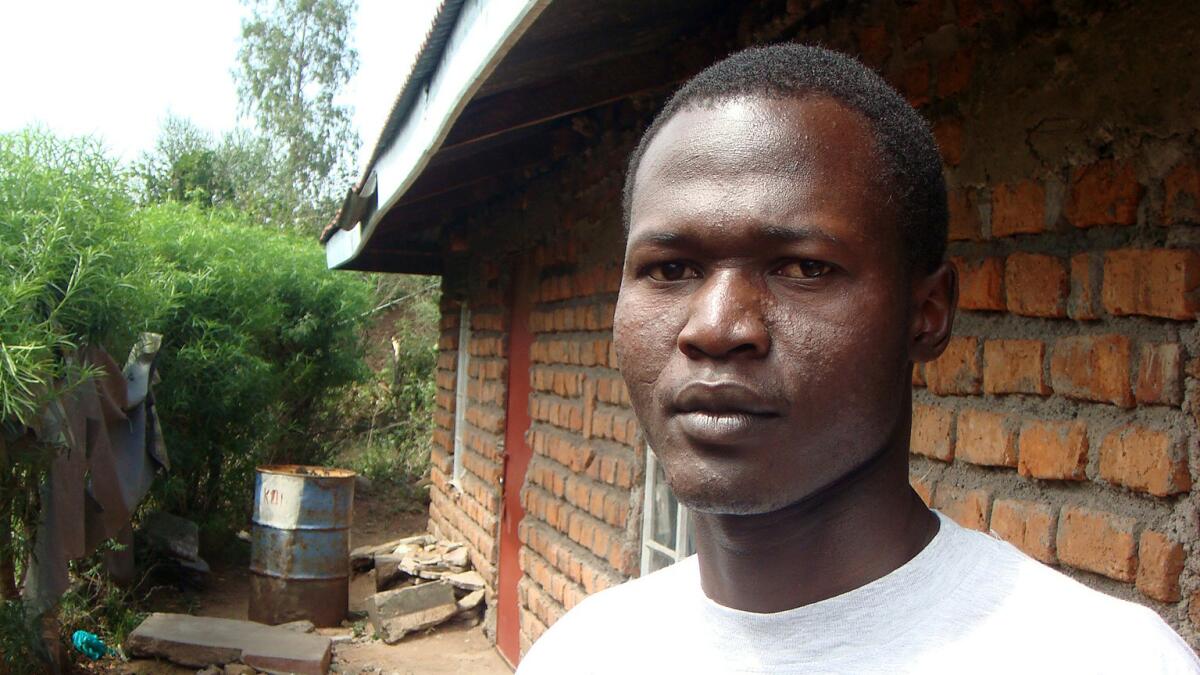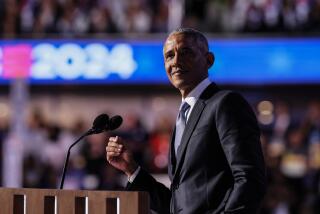From the archives:: Obama-inspired hope goes only so far in Kenya

Barack Obama, 26, who was named after the president-elect’s Kenyan father, was elated when his namesake was elected, but the euphoria is fading as he realizes that his chances of achieving the same success in Africa are slim.
- Share via
Reporting from KOBAMA, KENYA — He’s from the same family that produced President-elect Barack Obama. He shares many of the same hopes and dreams. He’s even got the same name.
This Barack Obama, 26, a cousin who was named after the president-elect’s Kenyan father, was elated when someone with African roots rose to the world’s most powerful job.
“I felt I could do anything,” said the lanky student, whose buddies now call him “the President” after his famous U.S. relative. “I felt anything is possible.”
There is no question the U.S. president-elect’s victory has encouraged countless Africans to reach for new heights. But as the euphoria over his election begins to fade here, young Africans are beginning to see his inspirational story as bittersweet.
As the American Obama’s success is institutionalized in pictures hanging in schools and buses and in speeches in parliament promoting change, many are coming to see his against-the-odds accomplishment as something that was really only possible in the United States.
In Africa, money, ethnicity and family connections still count more toward success than does hard work. Bribes usually trump talent; corruption tops integrity. Young Africans hoping to follow in Obama’s footsteps -- even those with the same name -- may face disappointment and disillusionment.
“The hope might be false,” said youth activist Joshua Nyamori. “Today Obama’s story is not possible in Kenya. If Barack ran in Kenya, he would have failed.”
This month, the president-elect’s young cousin finished his college exams and is now hitting the pavement in search of work as an electrical engineer. But fewer than half of Kenya’s university graduates find employment, and this Barack Obama is already feeling decidedly more somber about his future. He can count only two of his friends in the last four years who have been hired after graduation.
“We have diplomas but no jobs,” he said. “It’s almost a waste of time.”
Yet all around him is Obama-inspired hype. The mythology surrounding the presidential campaign is already as deeply rooted as the mango trees around Lake Victoria.
From the campus of Sen. Barack Obama Secondary School to Obama’s ancestral homestead, teachers, parents and elders wag their fingers at the young, repeating the mantra: See what can happen if you work hard?
At Obama Secondary School, in rural western Kenya, officials say students were so electrified by the U.S. election that teachers are expecting to see an improvement in year-end test scores.
“Young people are clamoring for change,” said Principal Yuanita Obiero.
One of the school’s top-ranking students, Lillian Boyi, 16, wonders whether hard work will ever be enough. She already studies 12 hours a day, six days a week, and dreams of attending medical school. But a shortage of books means she must share with other students. There’s no computer or science lab. On average, only two graduates a year from the school’s senior class of about 40 students make it to university.
Nationwide, the odds aren’t much better. Despite free basic education, fewer than half of Kenyan children make it to high school. Fewer than 5% go to college.
Even if Lillian is one of the lucky few, her parents, who are farmers, don’t have the money for tuition. Instead, as a girl in a rural area, she will face pressure to marry and have children.
“In Kenya, you can work hard but still find yourself with nothing,” she said.
After Kenya’s disputed presidential election last year, frustration levels soared among young people. Ethnic clashes killed more than 1,000 people. Thousands more rioted, looted and burned their voting cards in protest.
Months later, a wave of riots and arson attacks swept across high school campuses nationwide, as young people protested poor conditions, teacher maltreatment and rigorous testing schedules.
President-elect Obama, just as he appealed to young people in the U.S., became a role model for many Kenyans.
“It’s one thing when an older person here tells you, ‘Hey, you can make it,’ but they themselves have not made it,” said student leader Otieno Alfred Ogweno, 18. “It’s different to see someone who actually has made it.”
Ogweno is already modeling much of his life on the president-elect. A straight-A student, he is prime minister in Kenya’s mock Children’s Parliament. He’s appeared on television defending campus protests and writes a newspaper column for teens.
Though he too is a distant cousin of the president-elect, his family isn’t rich or well connected. He’s a member of the Luo ethnic group, which has long been at odds with the politically dominant Kikuyus. Obama’s father ran into the same ethnic roadblock when he returned to Kenya from the U.S. and entered politics.
Inspired by Obama, Ogweno took a year off after high school last year to work as a youth organizer, setting up nonprofit money-raising ventures to help students earn cash for school fees.
“My dream is to lead this country, and the continent,” said Ogweno, who is planning to study law next year.
He’s got so much energy, his foot almost never stops tapping and he speaks in rapid-fire bursts of words. Teachers and adults, he said, often call him rude because he has an opinion on every issue.
But asked to name someone who has achieved the same success and overcome the same obstacles here that Obama did in the U.S., Ogweno is stumped. He could think only of a Kenyan minister who was assassinated.
“That’s a tricky question,” he said after a long pause. Even in his own family, unemployment is rampant and success stories are rare.
“My uncle has a master’s degree in engineering and now he’s sweeping floors,” he said.
Does Ogweno ever worry he might face the same fate? He thought about it and shook his head.
“No,” he said. “For me it’s 110% possible. I will make it.”
The story of the other Barack Obama, the young electrical engineering student, shows how the best-laid plans can come up against the harsh realities of Africa.
He entered the world with high expectations, named for the president-elect’s successful father, an economist who died in a car crash the day after the young man was born.
He dreamed of becoming a doctor and thrived academically. But his father died of malaria when he was a young boy. Then in high school, he lost his mother to cancer.
An uncle made sure the young man finished his studies, and he applied for medical school. But a Nairobi-based college twice rejected him.
The family blames tribalism and nepotism -- they’re from the wrong tribe and refused to pay a bribe. He ended up in a less prestigious polytechnic school.
“It’s all a matter of who you know,” he said.
As the optimism he felt after the U.S. election begins to fade, he’s looking at his situation a bit more practically and, perhaps, cynically. He said he plans to ask relatives close to the president-elect if they’ll help him get a visa to study in the U.S.
Nyamori, the youth activist, said it’s not surprising that young people take away such lessons. He said it might be another generation before Kenya offers the same opportunities found in the U.S. Still, he said, the inspirational story from across the ocean is vital.
“Hope is the thing that gives you the strength to wake up,” he said. “Even false hope is better than no hope at all.”
More to Read
Sign up for Essential California
The most important California stories and recommendations in your inbox every morning.
You may occasionally receive promotional content from the Los Angeles Times.













